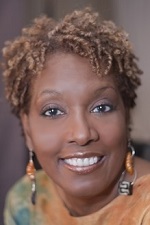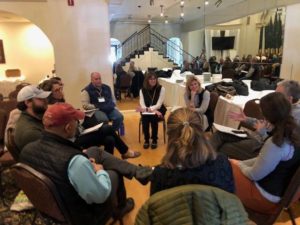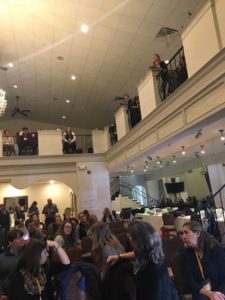Camp Directors Gather to Consider Diversity and Inclusion
When close to 80 Maine camp directors gathered Tuesday in Portland to discuss diversity and inclusion, they were challenged to consider the impact of differences and division, and to seek to “create balance in an unbalanced world.”

The workshop was sponsored by Maine Summer Camps, a non-profit organization supporting the work of more than 120 member camps. It was led by Niambi Jaha-Echols, a former American Camp Association board member, an expert in the field of cross-cultural agility, and long-time advocate of doing “heart-centered” work to achieve human connection among different communities and cultures.
Jaha-Echols and Meg Kassen, director of Hidden Valley Camp in Freedom, began the session by telling the group that the word “camp” has an early 16th century definition of “level ground.”
“We’re trying to get back there,” Jaha-Echols said.
The Bottom Line Is We Are Seeking Connection
“As we talk about diversity and inclusion, lots of things go into that piece,” she said. “Even in the room, there is lots of diversity.”
Jaha-Echols says that by achieving not just understanding, but “inner-standing,” groups can come together.
“Instead of pretending that racism doesn’t exist, and we don’t see our color and differences, let’s move through it to a bigger, wider possibility,” she urged the group. “In order to get there, we have to admit that everything we may think we know is wrong, and that we truly are connected beyond our wildest imaginings.”
Those with “the privilege of being white, can represent themselves,” she said. “If you’re a minority, there’s a feeling that you represent a whole group.”
“I represent myself,” she said.
Characteristics that contribute to a person include age, class, spiritual beliefs, culture, income, sexuality, and broader qualities such as work style, communication style, and political beliefs.
Racial differences are not real, Jaha-Echols told the group. Skin is simply a cover, an “Earth Suit,” she said.
“The color of skin tells only one thing: the color of skin.”
“As we work to create a diverse group, we need to remember all this,” she said. “We have to start looking at people as individuals. The bottom line, we are seeking connection.”
Participants Listened to the Podcast “Seeing White”
Jaha-Echols, prior to the workshop, had urged participants to listen to the podcast entitled “Seeing White,” created by journalist John Biewen, which examines questions of race and racism. Individuals “need more practice having these conversations – juicy and authentic conversations,” she said.

As she encouraged workshop participants to have those conversations, Jaha-Echols used the analogy of a Star Wars storm trooper as a means of explaining white privilege. Many individuals “inherited the storm trooper suit,” a suit worn by many who historically have “done terrible things.”
“It’s not who you are, but it’s hard to get rid of. It’s hard to dismantle. Some people may not see anything but a storm trooper suit,” she said. But by being a storm trooper who “goes rogue,” individuals can change the narrative.
White privilege is an “all-access pass,” Jaha-Echols told the group, enabling conversations “with other storm troopers.”
Nature is the Level Ground That Unites Everyone
“There’s an opportunity to change the narrative. We know how white people think. We can be gentle and compassionate,” she said. And at camps, nature is the level ground that unites everyone, she said.
In addition to participating in small group discussions about the challenges of addressing questions of diversity, workshop participants heard Jaha-Echols’s strategies for camps.
Changes should come based on a desire for enrichment, she said. “Create heart-centered relationships. No one wants to feel like they’re fulfilling a quota.”
Camps Should Seek Input About Creating More Diversity
In addition, camps should seek input from current families and campers, ask how they feel about creating more diversity. Offering use of the camp to cultural groups, offering family camp, and focusing on language competency are other strategies camp directors can consider.
Jaha-Echols also challenged workshop participants to examine camp traditions and culture to identify aspects that could be misconstrued or that are insensitive. “Doing things differently is really hard because traditions are entrenched,” she said.
All humans seek connection, Jaha-Echols told her audience. They seek to be loved, respected, and accepted. And the work of diversity and inclusion is “heart work,” she said.
“We don’t see things the way they are, we see things the way we are.”
Jaha-Echols provided participants with questions to consider as they contemplate their own camps. How does “whiteness” act as the norm at camp, how would other cultures respond to your camp culture, what is sacred at camp, and what are core values?
“Are your traditions the vehicle or the destination?” she asked.
Camp Directors Now Must Consider How To Move Forward
Beigette Gill, director of Fernwood Cove, a girls’ camp in Harrison, chairs the Maine Summer Camps education committee which organized the workshop. Gill said she was “super pleased” with the program, commending Jaha-Echols approach as “genuine and authentic.”

“She just exudes what she preaches about love, respect and acceptance.”
It is now up to camp directors to consider how to move forward, Gill said.
“I always love her approach. For me a takeaway is remembering we’re all human.”
Catriona Sangster, director of girls’ Camp Wawenock in Raymond and president of Maine Summer Camps agreed. “Niambi comes from a place of love, and for our organization that was a good approach.”
“I definitely think it’s just a starting point for the work that needs to be done,” she said. “It started conversations.”